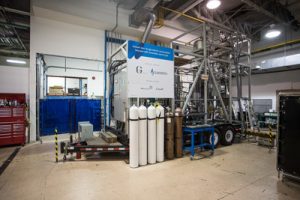Gaz Métro has announced that its pilot project – to convert forest waste into second generation renewable natural gas – was successful. The tests were conducted in collaboration with G4 Insights at the Natural Gas Technologies Centre in Boucherville. The demonstration process enabled Gaz Métro to develop a conversion process that they say is unique in the world. The company also says the pilot process has marked an important milestone in the development of new renewable energy technology in Québec.
Gaz Métro and G4 used a thermochemical process called PyroCatalytic Hydrogenation (PCH) to transform wood chips from Québec into renewable natural gas. The process is now ready to be tested in a larger pilot project that will produce greater volumes, according to Gaz Métro.
“With this small-scale project, we proved that PCH is technologically viable. It is now essential that we press ahead with our efforts, so as to determine how we can improve the process even further and increase its production potential,” said Martin Imbleau, Vice President, Development and Renewable Energies at Gaz Métro. “Our goal is to use forestry biomass and produce a “green” energy supply of Québec-sourced and renewable natural gas. This natural gas, over the coming years, could be used locally or injected into our network to supplement the renewable natural gas being generated by the biomethanization projects of Québec municipalities that have opted to transform organic waste into energy,”
Imbleau added, “Our project on renewable natural gas from forest biomass is well aligned with the spirit of Québec’s 2030 Energy Policy. It’s one more tangible example of our determination to leverage our expertise and leadership for the sake of energy innovation and transition.”


